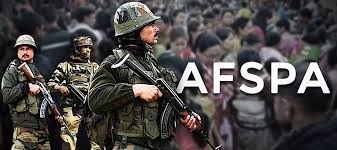AFSPA stands for Armed Forces Special Powers Act.
Violence became the way of life in north-eastern States of India. State administration became incapable to maintain its internal disturbance. Armed Forces (Assam and Manipur) Special Powers Ordinance was promulgated by the President on 22nd May of 1958.
In which some special powers have been given to the members of the armed forces in disturbed areas in the State of Assam and Union Territory of Manipur. Later the Ordinance was replaced by the armed Forces Special Powers Bill.
Key Takeaways
The AFSPA in its original form was promulgated by the British in response to the Quit India movement in 1942.
After independence, Prime Minister Jawaharlal Nehru decided to retain the act, which was first brought in as an ordinance and then notified as an act in 1958.
AFSPA provides for special powers for the armed forces that can be imposed by the Centre or the Governor of a state, on the state or parts of it, after it is declared “disturbed’’ under Section 3.
The Act defines these as areas that are “disturbed or dangerous condition that the use of armed forces in aid of the civil power is necessary’’. AFSPA has been used in areas where militancy has been prevalent.
The Act, which has been called draconian, grants extensive powers to the armed forces. It permits them to open fire’, against any person in contravention to the law or carrying arms and ammunition.
It gives them powers to arrest individuals without warrants on the basis of “reasonable suspicion” and search premises without warrants.
The Act further provides blanket impunity to security personnel involved in such operations: There can be no prosecution or legal proceedings against them without the prior approval of the Centre.
Notably, while the Act gives powers to the central government to unilaterally take the decision to impose AFSPA, this is usually done informally in consonance with the state government.
The Centre takes its decision after having received a recommendation from the state government.
The AFSPA grants security forces the authority to open fire; however, this can only occur after a prior warning is given to the suspect.
Additionally, the Act says that any suspects apprehended by security forces should be handed over to the local police station within 24 hours. It also emphasizes that the armed forces should work in cooperation with the district administration, rather than operating as an independent entity.
Source: Ministry of Home affairs
Efforts to repeal AFSPA or limit its operational area
In 2000, activist Irom Sharmila began a hunger strike that lasted for 16 years in opposition to the Armed Forces (Special Powers) Act (AFSPA) in Manipur.
In 2004, the central government established a five-member committee led by former Supreme Court Justice Jeevan Reddy. The committee submitted its report in 2005, recommending the repeal of AFSPA. The report described the act as “highly undesirable” and stated that it had become a symbol of oppression.
Subsequently, the Second Administrative Reforms Commission, headed by Veeerapa Moily, endorsed these recommendations.
Manipur has had the Disturbed Area status under the AFSPA since 1980, and it was only withdrawn from some parts of Imphal in 2004 following strong protests after the killing of 32-year-old Thangjam Manorama earlier that year.
Since 2022, areas notified as Disturbed Areas have been incrementally reduced.
The Disturbed Areas notification is applicable for a period of six months, following which it can be periodically extended by the MHA after assessing the situation.

